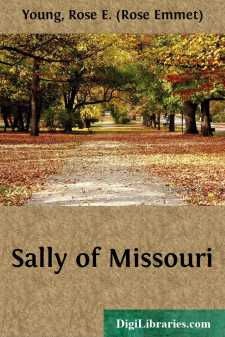Categories
- Antiques & Collectibles 13
- Architecture 36
- Art 48
- Bibles 22
- Biography & Autobiography 813
- Body, Mind & Spirit 142
- Business & Economics 28
- Children's Books 14
- Children's Fiction 11
- Computers 4
- Cooking 94
- Crafts & Hobbies 4
- Drama 346
- Education 46
- Family & Relationships 57
- Fiction 11829
- Games 19
- Gardening 17
- Health & Fitness 34
- History 1377
- House & Home 1
- Humor 147
- Juvenile Fiction 1873
- Juvenile Nonfiction 202
- Language Arts & Disciplines 88
- Law 16
- Literary Collections 686
- Literary Criticism 179
- Mathematics 13
- Medical 41
- Music 40
- Nature 179
- Non-Classifiable 1768
- Performing Arts 7
- Periodicals 1453
- Philosophy 64
- Photography 2
- Poetry 896
- Political Science 203
- Psychology 42
- Reference 154
- Religion 513
- Science 126
- Self-Help 84
- Social Science 81
- Sports & Recreation 34
- Study Aids 3
- Technology & Engineering 59
- Transportation 23
- Travel 463
- True Crime 29
Sally of Missouri
Description:
Excerpt
Chapter One
STEERING OF NEW YORK
"Hoo-ee-ow-ohme!"
It was half a sob, half a laugh, and, half sobbing, half laughing, the young man stopped his horse on the crest of the Tigmore Hills, in the Ozark Uplift, raised in his stirrups, and looked the country through and through, as though he must see into its very heart. In the brilliant mid-afternoon light the Southwest unrolled below him and around him in a ragged bigness and an unconquered loneliness. As far as eye could reach tumbled the knobs, the flats, the waste weedy places, the gullies, the rock-pitted sweeps of table-land and the timbered hills of the Uplift. The buffalo grass trembled across the lowlands in long, shaking billows that had all the effect of scared flight. From the base of the Tigmores a line of river bottom stretched westward, and beyond the bottom curved a pale, quiet river. In the distance wraiths of blue smoke falteringly bespoke the presence of people and cabins; on a cleared hill an object that might be horse or dog or man was silhouetted, small and vague; and in the farthest west the hoister of a deserted zinc mine cut up against the sky a little lonely way. The near and dominant things were constantly those tremulous, fleeing billows of grass, the straight strong trees, the sullen rocks, the silent, shivering water.
"Hoo-ee-ow!"
It was too vast, too urgent. Waiting, ready, it lay there aggressively, like a challenge. As the young man faced it, it claimed him, forcing back his past life, his old habits, his old haunts, into the realm of myth and moonshine. His old habits! His old haunts! They hung aloof in his consciousness, shadow pictures, colourless and remote.... That zestful young life at New Haven, the swift years of it, the fine last day of it, Yale honours upon him, his enthusiasms cutting away into the future, his big shoulders squared, his face set toward great things, the righting of wrongs, grand reforms, the careers of nations.... A bachelor hotel; a club whose windows looked out on the avenue; an office where Carington and he had pretended to work down on Nassau Street; drawing-rooms where Carington and he had pretended to be in love, on various streets; the whole gay, meaningless panorama of his life as a homeless, unplaced New York sojourner, who had considered that he had too much money to be anything seriously and too little money to do anything effectively.... Then another picture, jerking, mazy, a study in kinematics—"Crazy Monday" on the Street, Carington and he swept along in that day's whirlwind of speculation.... A blank in the panorama while he got used to things and thought things out.... Then a wintry twilight at the club, Carington and he by the window, talking it over, looking out upon the drifted light of the city, loving the city, in the way of New Yorkers. Then Carington's voice saying, "Bruce? Bruce, m' son? Why don't you try Missouri?" Saying it with that in his voice to indicate that there was nothing else left to try. Then the long thoughtful talk, Carington and he still by the window, while he showed Carington how little chance he had even in Missouri; then Carington's strong-hearted insistence that, in view of the agitation over the ore discoveries at Joplin, he go on "out there" and prospect; and then Carington's foolishly irrelevant heel-piece, "Miss Gossamer sails for Europe Saturday!" and the sudden appeal of the notion to go "out there," its sharp striking-in.......


